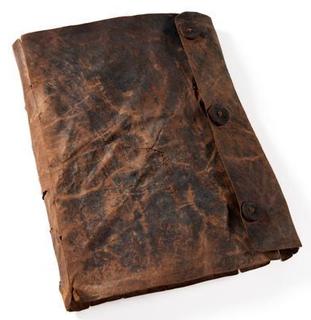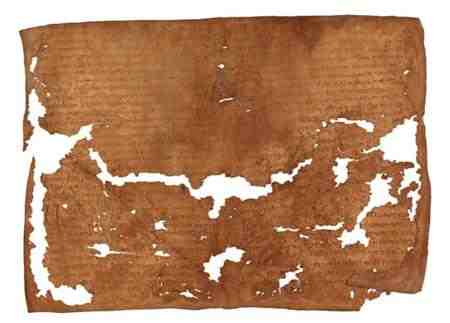A difficult stretch to write about today. I finished I.4, and enjoyed reading it, with much of it making sense. Am not feeling able to do an illuminating exegesis of a short extract, however, and am not able to put some thoughts together more generally.
* * *
 |
| The Faddan More Psalter, cover |
I am still stuck on the theme from yesterday's post, about finding precious books in bogs that were deliberately hidden from those who would plunder them. It is a particularly Irish notion, and is a rich metaphor for thinking about FW, or documents and letters within FW (like ALP's letter) that, in a mise en abyme, stand for the whole. I want to think beyond FW, though in its mode, about how every book (anything written) is like a bog book, or maybe isn't.
A single book is a fragile thing, and with a normal life of being used frequently, would not survive past more than a few generations, if that. I know from studying ancient papyrus scrolls that repairs were needed, and recopying (making a new book) was the preferred way to preserve knowledge. But buried in a bog, a book can last for centuries, maybe even millennia. It is the same for people, when they are buried in bogs, and some have been found that were buried over 2,000 years prior, in a remarkable state of preservation.
 |
| The Faddan More Psalter, excerpt |
Though no longer read, the preservation that comes with bog burial keeps the disintegration of letters at bay, and makes a book as potentially readable (with some cleaning up and counter-measures, of course), theoretically, as any book on your shelf waiting for you to tolle lege. No oblivion comes for this book, unlike for Baudelaire's imagined self buried in a garden, wanting to dormir dans l'oubli comme un requin dans l'onde ("like a shark in the wave"; from his poem "Le Mort joyeux").
But does burial and preservation lead to transformation? Unlike the ancient myth where drowning in the Nile led to immortality, burial (mud-drowning) in a bog brings about a stasis. Without retrieval and re-reading, the one ensconced in that eternal mud ends up like the sibyl of Cumae. But even the sibyl retains her voice, however withered and small. Only when the eternity of preservation ends and the bog book is retrieved, can its voice (ours, yours, the one who takes up and reads) return.
Images of the Faddan More Psalter from Wikipedia; read more about it.

No comments:
Post a Comment